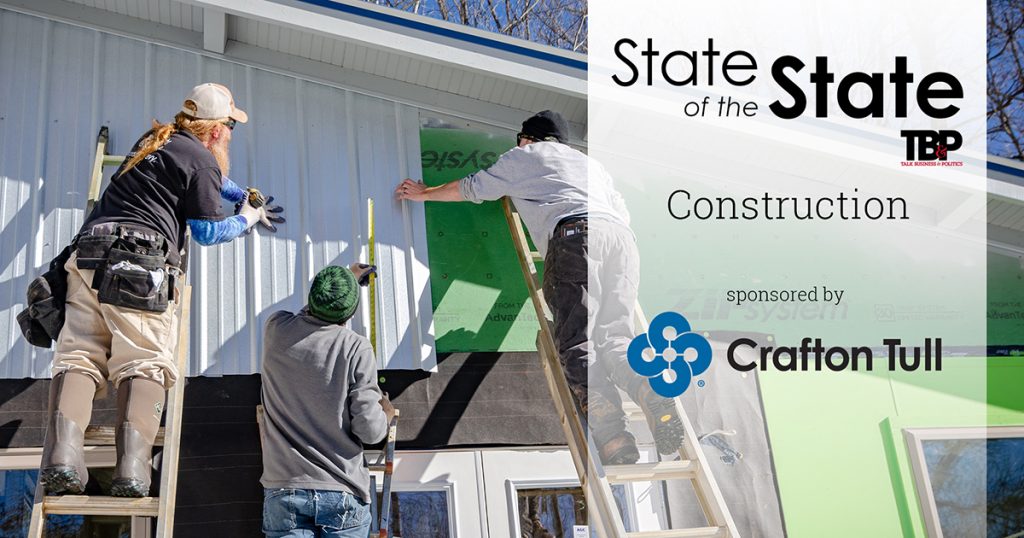
Arkansas’ construction sector dealt with a mix of new and old problems in 2022. Record inflation, interest rate hikes, and chronic supply chain issues continued to plague the industry during the last year and going into 2023.
Despite those problems, Nabholz CEO Jake Nabholz told Talk Business & Politics the company had a banner year and 2023 is projected to possibly be even better.
“I think everybody had a really good year,” he said. “As an industry we had to overcome record inflation and continued supply chain issues. We are excited about 2023, but I’m anxious to see what happens in 2024.”
Construction material prices rose by 10.1% from November 2021 to the same month in 2022, according to the Associated General Contractors of America. Subcontractor services used to finish off projects also increased.
“Although inflationary pressures are cooling in some areas, overall costs for construction are still rising at painfully high rates,” said Ken Simonson, the association’s chief economist. “In addition, subcontractors are reacting to higher materials and labor costs by raising their prices.”
Another problem in the industry, labor shortages, seemed to lessen during the last year but it still remains an issue. Arkansas had 53,300 workers in the construction sector when the pandemic began in March 2020, according to the U.S. Department of Labor. That number had grown to 54,500 by October of 2022, but it was still a 1.4% drop from the previous year. Overall, the workforce has grown by 2.3% during the last three years.
AGC reported that there was a 1.3% uptick in construction projects overall in Arkansas during 2022.
Supply chain issues have plagued the industry since the start of the pandemic. Supply chain issues have hindered projects and thrown schedules off in unprecedented ways, Ramson’s Construction co-owner Scott McDaniel told Talk Business & Politics. Inflation continues to spike and getting simple, affordable supplies such as doors and windows can be a challenge.
“Supply chain issues continue to be a factor for all business sectors as well as local government. The need for longer lead times for certain products, identifying and using alternative products and rising overall costs certainly will continue to impact our country and community,” he said. “Private industry faces the same challenges. Their timelines are impacted, and they must be creative, and they are.”
Supply chain problems existed in 2021, but the construction companies really learned about the depths of those problems in 2022, Nabholz said. Getting certain materials for projects can always be an problem. For example, plumbing supplies might be in short supply in normal times, he said. Now, the problem extends to all supplies in every part of the sector and that has not happened before, he added.
One positive is companies are learning better ways to deal with the supply chain problems and how to relay that information to customers, he said.
Inflation and interest rate hikes will have an impact on residential, commercial, and public building at some point, Nabholz said. Many national and state organizations are projecting a slowdown in the residential construction market in 2023 as a result of the interest rate hikes. Housing shortages in parts of Arkansas will likely keep some residential building in the black, and according to Richard Branch, chief economist for Dodge Data & Analytics, the interest rate hikes could help to solve the inflation issue.
The Federal Reserve has continued to raise interest rates to bring down inflation and those rates may not be raised anymore after March, Branch said. If no other major event jolts the economy then inflation is projected to ease and by the second half of 2023 the economy should start to improve. That will have a trickle-down effect to all parts of the construction industry, he added. Materials should start to cost less, and the country could narrowly avoid a recession, the economist said.
Nabholz primarily deals with public projects, so the interest rate component hasn’t impacted them at this point. But, they schedule projects out 12-18 months in advance and scheduling projects for 2024 has started to slow, slightly, he said. Inflation has impacted all businesses in the sector, but it really hits owners hard when they are trying to build or expand their businesses.
“The bottom line is they are getting less for their money. That’s really hard,” Nabholtz said. “We just have to forecast our projects the best way we can to take into account inflation and these other factors.”
Editor’s note: The State of the State series provides reports twice a year on Arkansas’ key economic sectors. The series publishes stories to begin a year and stories in July/August to provide a broad mid-year update on the state’s economy. Link here for the State of the State page and previous stories.
The post State of the State 2023: Construction sector faces inflation, labor, supply chain issues appeared first on Talk Business & Politics.
This content was originally published here.









